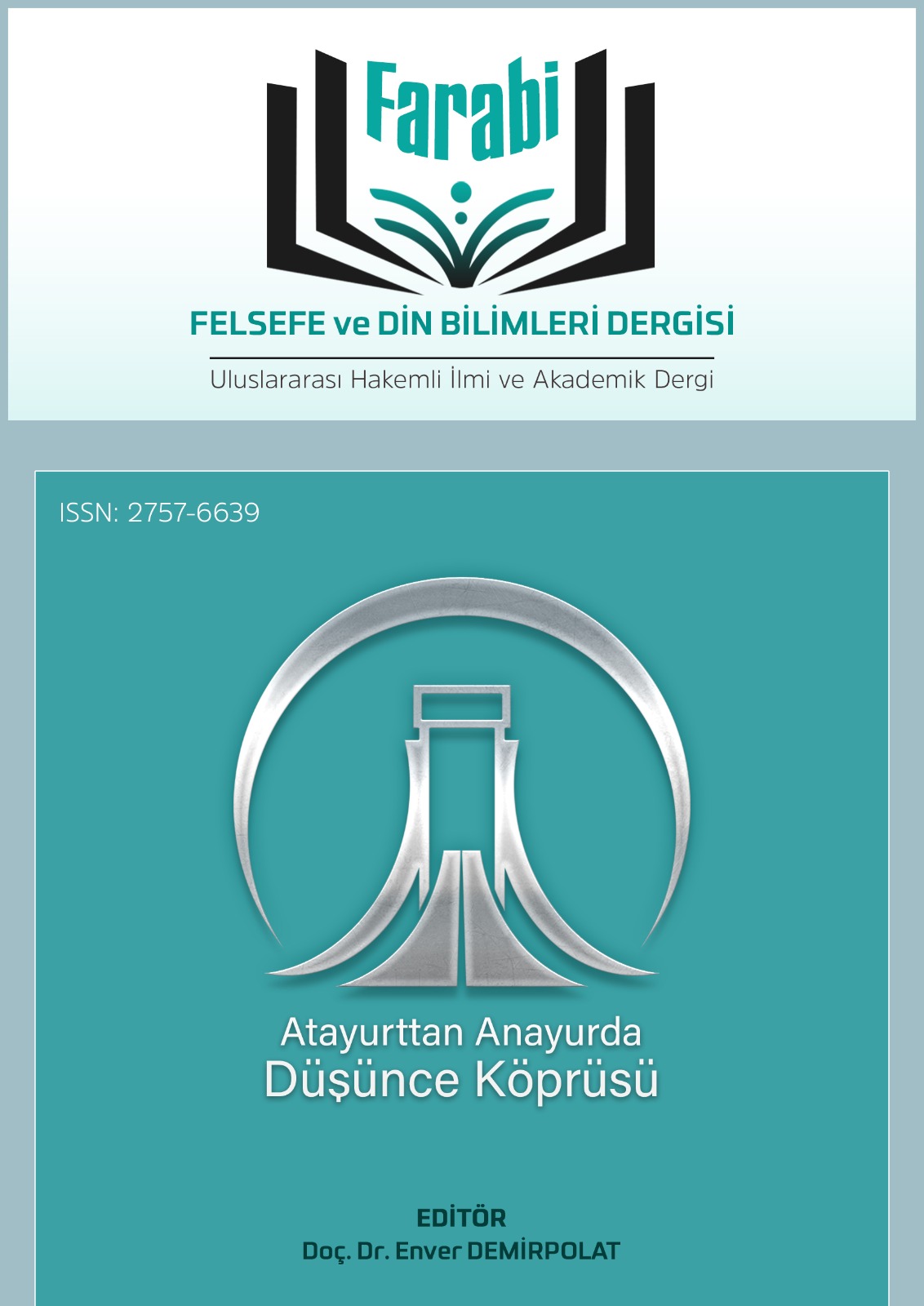Author :
Abstract
Farabi’nin bilgi teorisinde nefsin hiss-i müşterek ve hayal güçlerinin önemli bir yeri bulunmaktadır. Çünkü bu iki güç, nefsin diğer güçlerinden elde edilen verileri bir araya getirerek bilgi formatına dönüştürür. Bir başka ifadeyle elde edilen bilgileri kavram haline getirir. Ona göre bir şeyin kavram haline gelmesi, bilen, bilinen ve bilme eyleminin aynileşmesi anlamına gelmektedir. Hiss-i müşterek ve hayal kavramlarını incelemeden önce bilgi ve bilgi felsefesi demek olan epistemoloji kavramları üzerinde kısaca durmak istiyoruz. Çünkü bu iki kavram, epistemolojinin de temel kavramlarındandır.
Keywords
Abstract
Many philosophers have thought about knowledge and ways of acquiring knowledge and have put forward different ideas. One of them is Farabi. In Farabi's theory of knowledge, the concepts of "imagination" and "common sense" are of great importance.
According to Farabi, the realization of the act of knowing happens in stages. The external senses, which we call the five senses, are involved in the first stage. With the external senses, the aspect of material assets belonging to each sense is perceived one by one. These sense data, which are perceived separately, are brought together in common sense, which is one of the inner sense powers, and a single judgment about that object is formed in the human mind. This information, which is formed about the object in the common sense, is transmitted to the imagination. By combining and separating this information, the imagination makes some true or false inferences about the object and transfers these inferences to the power of reason by storing them in itself.
Keywords
- Aristoteles, Ruh Üzerine, (çev. Ömer Aygün, Y. Gurur Sev), Pinhan Yayınları; İstanbul, 2018.
- Aydın, İbrahim Hakkı, Farabi’de Bilgi Teorisi, Ötüken Neşriyat: İstanbul, 2003.
- Aydınlı, Yaşar, Farabi’de Tanrı-İnsan İlişkisi, İz Yayıncılık; İstanbul, 2008.
- Bayrakdar, Mehmet, İslam Felsefesine Giriş, TDV Yayınları: Ankara, 1997.
- Bolay, Süleyman Hayri, Felsefe Doktrinleri ve Terimleri Sözlüğü, Akçağ Yayınları: Ankara, 2004.
- Cevizci, Ahmet, Felsefe Sözlüğü, Paradigma Yayıncılık: İstanbul, 2010.
- Dağtaşoğlu, Ahmet Emre, “Antik Yunan Felsefesi’nde ‘Fantasia’nın Epistemolojik Rolü”, Felsefe ve Sosyal Bilimler Dergisi, 2014.
- Erdoğan, İsmail, “İslam Filozoflarının Rüyanın Mahiyeti Hakkındaki Görüşleri”, İslami Araştırmalar Dergisi, 2003, C. 16, S. 1.
- Farabi, es-Siyasetü’l-Medeniyye veya Mebadi’ül-Mevcudat, (çev. Mehmet S. Aydın, Abdulkadir Şener, M. Rami Ayas), Büyüyen Ay Yayınları: İstanbul, 2017.
- Farabi, İdeal Devlet, Çev. Ahmet Arslan, Türkiye İş Bankası Kültür Yayınları: İstanbul, 2018.
- Farabi, Mutluluğun Kazanılması, (Çev. Ahmet Arslan), Türkiye İş Bankası Kültür Yayınları, İstanbul, 2018.
- Filiz, Şahin, “Bilgi-İnanç Bağlamında Farabi’nin Bilgi Felsefesi”, Uluslararası Farabi Sempozyumu Bildirileri, Elis Yayınları: Ankara, 2004.
- Filiz, Şahin, Farabi, İnsan Yayınları: İstanbul, 2005.
